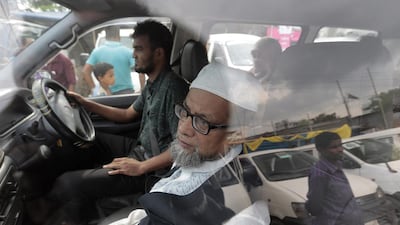Dhaka // Bangladesh hanged a wealthy tycoon and top financial backer of its largest Islamist party late on Saturday for war crimes.
Mir Quasem Ali, a key leader of the Jamaat-e-Islami party, was executed after being convicted by a war-crimes tribunal for offences committed during the 1971 independence conflict with Pakistan.
The 63-year-old was hanged at the Kashimpur high security jail in Gazipur, north of Dhaka, amid stepped-up security outside the prison and in the capital.
“The execution took place at 10.35pm [8.35 UAE time],” the country’s law and justice minister Anisul Huq said.
Six opposition leaders have now been executed for war crimes after the secular government led by prime minister Sheikh Hasina set up a domestic war crimes tribunal in 2010.
With Ali’s death, all five top leaders of the Jamaat party have been hanged.
After the Supreme Court rejected his final appeal against the penalty on Tuesday, Ali declined to seek a presidential pardon, which would require an admission of guilt.
Prosecutors said Ali was a key commander of the notorious pro-Pakistan militia in the southern port city of Chittagong during the war, and later became a shipping, banking and real estate tycoon.
The war crimes trials have divided the country, with supporters of Jamaat and the main opposition Bangladesh Nationalist Party (BNP) branding them a sham aimed at eliminating their leaders.
The executions and convictions of Jamaat officials plunged Bangladesh into one of its worst crises in 2013 when tens of thousands of Islamist activists clashed with police in protests that killed 500 people.
Family members met Ali for the last time in the prison just hours before he went to the gallows.
“All along he said he was innocent. He said he is being killed unjustifiably,” said Tahera Tasnim, one of Ali’s daughters after 23 members of his family met him.
Ali had helped revive Jamaat and made it a potent force in Bangladesh politics by setting up charities, businesses and trusts linked to it after it was allowed to operate in the late 1970s.
Before he was arrested in 2012, Ali headed the Diganta Media Corporation, which owns a pro-Jamaat daily newspaper and a television station that was shut down in 2013 for stoking religious tensions.
He was convicted in November 2014 of a series of war crimes including the abduction and murder of a young independence fighter.
Russel Sheikh, a police official, said officials had taken the “highest security measures” ahead of the execution for fear of violence by his supporters.
More than 1,000 police were deployed in Gazipur and hundreds of paramilitary border guards were outside the prison and in Dhaka, security officials told said.
*Agence France-Presse

